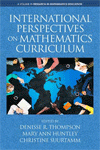
International Perspectives on Mathematics Curriculum
Edited by:
Denisse R Thompson, University of South Florida
Mary Ann Huntley, Cornell University
Christine Suurtamm, University of Ottawa
A volume in the series: Research in Mathematics Education. Editor(s): Denisse R Thompson, University of South Florida. Mary Ann Huntley, Cornell University. Christine Suurtamm, University of Ottawa.
Published 2018
Curriculum can be defined in a variety of ways. It might be viewed as a body of knowledge, a product, or a process. Curricula can differ as they are conceptualized from various theoretical perspectives to address the needs of teachers, students, and the context of schooling. One reason to study curriculum is “to reveal the expectations, processes and outcomes of students’ school learning experiences that are situated in different cultural and system contexts. … further studies of curriculum practices and changes are much needed to help ensure the success of educational reforms in the different cultural and system contexts” (Kulm & Li, 2009, p. 709).
This volume highlights international perspectives on curriculum and aims to broaden the wider mathematics education community’s understandings of mathematics curriculum through viewing a variety of ways that curricula are developed, understood, and implemented in different jurisdictions/countries. Within this volume, we define curriculum broadly as the set of mathematics standards or outcomes, the messages inherent in mathematics curriculum documents and resources, how these standards are understood by a variety of stakeholders, and how they are enacted in classrooms. The focus is on the written, implied, and enacted curriculum in various educational settings throughout the world.
CONTENTS
Preface. What Might Be Learned From Examining Curricular Perspectives Across Countries? Christine Suurtamm, Mary Ann Huntley, and Denisse R. Thompson. Primary School Mathematics in the Netherlands: The Perspective of the Curriculum Documents, Marc van Zanten and Marja van den Heuvel-Panhuizen. Curriculum in France: A National Frame in Transition, Ghislaine Gueudet, Lætitia Bueno-Ravel, Simon Modeste, and Luc Trouche. Mathematics Curriculum: The Case of Finland, Kirsti Hemmi, Heidi Krzywacki, and Anna-Maija Partanen. Curriculum in Canada: A Fractal Interpretation Using the Case of Alberta, Elaine Simmt. Mathematics Curriculum in the United States: New Challenges and Opportunities, Janine Remillard and Luke Reinke. A South African Perspective on the Mathematics Curriculum: Towards A Transcending Metacognitive Ideology, Divan Jagals and Marthie van der Walt. Discussing the Mathematics Curriculum in Brazil, Celi Espasandin Lopes and Regina Célia Grando. The Korean Mathematics Curriculum: Characteristics and Challenges, Kyeong-Hwa Lee, JinHyeong Park, and Na-Young Ku. Transcending Boundaries: What Have We Learned? Mary Ann Huntley, Christine Suurtamm, and Denisse R. Thompson. About the Editors. About the Contributors.
-
Paperback978-1-64113-043-1
Web price: $45.04 (Reg. 52.99)
-
Hardcover978-1-64113-044-8
Web price: $80.74 (Reg. 94.99)
- eBook978-1-64113-045-5

-
 A Five-Year Study of the First Edition of the Core-Plus Mathematics Curriculum
A Five-Year Study of the First Edition of the Core-Plus Mathematics Curriculum
-
 Approaches to Studying the Enacted Mathematics Curriculum
Approaches to Studying the Enacted Mathematics Curriculum
-
 Digital Curricula in School Mathematics
Digital Curricula in School Mathematics
-
 International Perspectives on Mathematics Teacher Education
International Perspectives on Mathematics Teacher Education
-
 Language and Mathematics Education
Multiple Perspectives and Directions for Research
Language and Mathematics Education
Multiple Perspectives and Directions for Research
-
 Researching Pedagogy and Practice with Canadian Mathematics Teachers
Researching Pedagogy and Practice with Canadian Mathematics Teachers
-
 Variability is the Rule
A Companion Analysis of K-8 State Mathematics Standards
Variability is the Rule
A Companion Analysis of K-8 State Mathematics Standards

